Overwhelmingly, people say they love the Dalai Lama because of his integrity. But what does that mean? And how can we live in the same way? How can we concretely learn from his teachings?
When I shot a documentary on the Dalai Lama, the people I interviewed about his message constantly expressed how honest and truthful he is. How there is a lack of duality in his message. He is the same person behind the scenes as he is on stage. He is the same when he meets a prime minister or president as when he shakes hands with a stranger on the street.
My first morning back from my 2-week long pilgrimage for peace, I am buying morning coffees when I realize: I messed up.
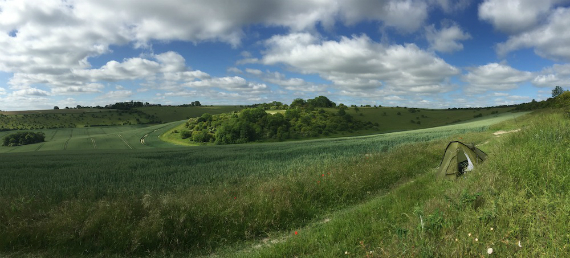
Photo Credit: Leon Stuparich
I wanted seeing my kids to be the first thing I did when I returned. However, exhausted and still in a whirl, I quickly became engulfed in the stress of my busy work life.
As I walk to my regular coffee cart, I find myself walking slower than usual. I'm still digesting the pilgrimage, a journey that blended ancient and modern trails. We pioneered a new pilgrimage route along the Thames Path and The Ridgeway, at times we were wild camping, and at others we had no idea where we were go to sleep or what we going to eat. But with faith, a good map, and a large amount of fortitude, we survived the epic journey with little more than a few bad blisters on our feet. Now home, I'm walking another path that I've walked hundreds of times before -- to and from the coffee cart -- but after walking penniless for two weeks, these steps today are some of the most striking.
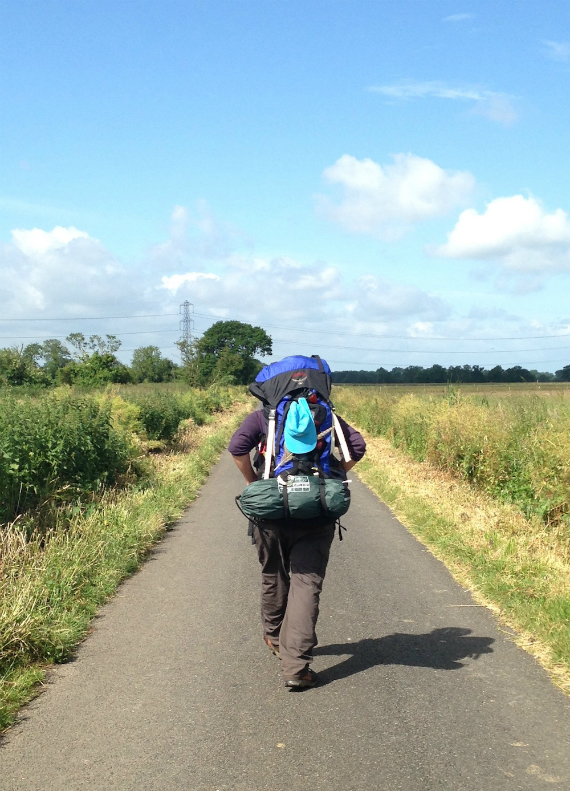
Photo Credit: Leon Stuparich
Maybe it's the contrast of walking this route before and after the pilgrimage, maybe it's the act of spending money again. I think it's more likely that last night I had my first good sleep in weeks and today I woke up with the striking clarity of how much I miss my family. I say to myself, "Today I will see my family no matter what."
As I stand in the queue for coffee, I realize that the explanation that "we're pilgrims on a penniless journey" is no longer required. That story we had to tell again and again for two weeks, in order to get food or shelter, is no longer my story. That story was who I was for a while.
Which is when a little bell rings in my head and I finally realize what I mean by "story" and where it fits in with the Dalai Lama's integrity that so many people talk about:
Your story is your ego.
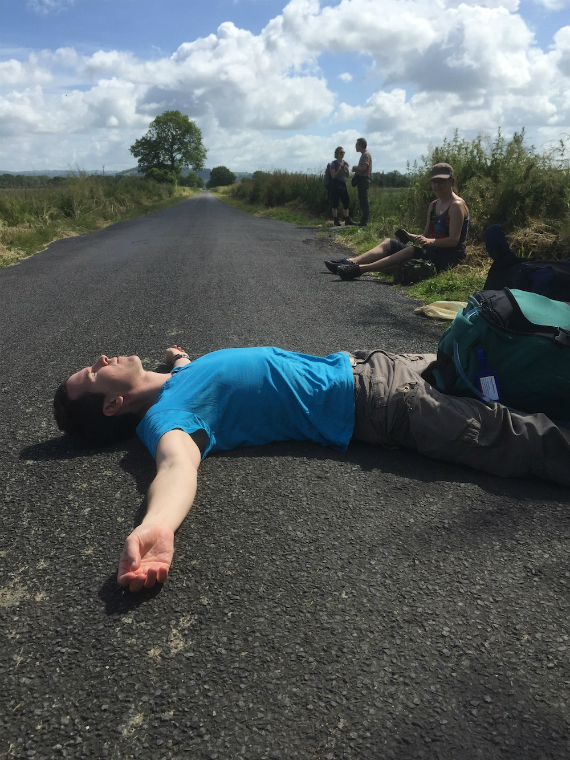
Photo Credit: Leon Stuparich
The story of the penniless pilgrim is one we created by going on the 200 mile walk. It was necessary to survive -- without it we would have starved. People loved the story. They loved our journey and we were taken in with so much love and kindness -- our story defined us.
Maybe, the story we tell ourselves and other people is not simply our ego -- it's the story we write to define our lives. In this case, the story you write is how other people read you. If you make up a false story -- a story of something you are not genuinely doing or being, then people will instinctively see through it. If your story genuinely reflects your heart and who you truly are as a person -- if it's a story of love and kindness -- then you are seen to have integrity.
So, what makes up a whole person? Perhaps it is a combination of our inner values and the ego story we tell ourselves. Is this what defines us in life? Is this what determines whether we are a success or failure? Is this how we ensure we live our lives to the fullest and live in our own integrity?
If we can identify our own individual inner values (what makes us happy, who and how we love, etc.) and express that through the story we tell of ourselves, then maybe life can open up and be the miracle it has the potential to be.
Realizing this, at the coffee cart, I am struck by the fact that, though I seem to have just arrived home from my "big journey," in fact it is just the beginning of a new journey for me. This journey is one of embarking upon understanding my own "story" and becoming comfortable with it. I can feel a skip of joy as I write this because I know I've never had the confidence to hear my own story.
If this is my lesson from working with the Dalai Lama's principles for seven years and going on a 200 mile journey, then I am infinitely grateful. The power of writing your own story -- with the help of others -- is an incredible concept.
It's always been my hope that the work I do will inspire other people. Whilst walking alone on the Ridgeway, Britain's most ancient road, during the pilgrimage I realised we are all walking together as one human family. If one person is inspired, we are all a little more inspired. This is why the story we tell ourselves and the stories that people say about us are so important.
Do you believe what others say about you?
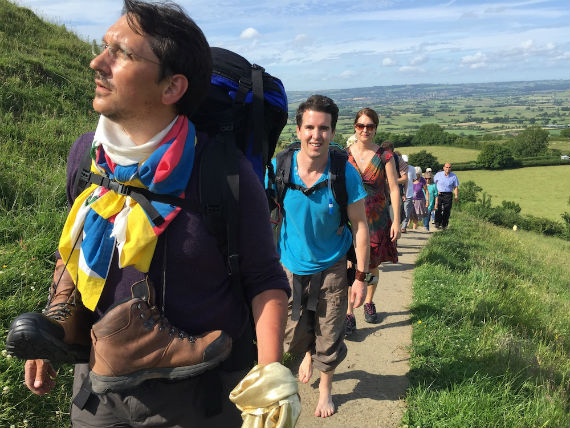
Photo Credit: Andrea Louisa Glazier
During the two weeks filming with the Dalai Lama, one of the most surprising things was his approach on self-confidence and determination. Not something I'd previously considered as part of creating peace. In an interview he gave me, he said, "Buddha taught: don't care what other people say. When one person says something critical then you should think: some people are praising me. When someone says a lot of praise, then you should think: I also have the critics. So it doesn't matter. As long as your own intention is honest, sincere. That's important. Paying too much attention to these things is silly."
Ignore the stories other people create for you. Receive them as a reflection of the story you're expressing, but don't let those external stories completely rewrite or change your own personal expression of your self. The power is within the story. The story is the conduit through which we connect to each other.
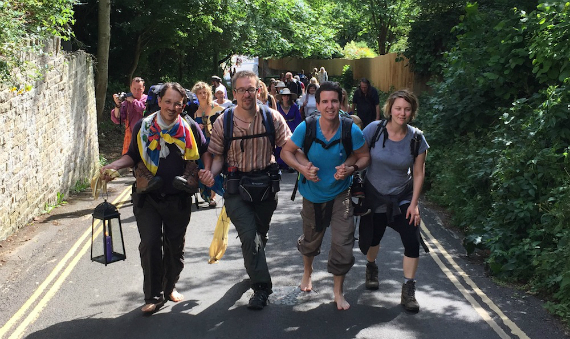
Photo Credit: Andrea Louisa Glazier
On the walk we naturally slowed down, and when we stopped to meet people, or they took up the pilgrimage and walked along with us for a while, the most powerful moments were always in hearing other people's stories. Listening. Now, in retrospect, it was as if we were listening to their hearts. If we are too busy to listen to the story, if we are too engrossed in our own stories to make the space needed in ourselves to receive the stories of others, it's the same as saying that we don't care or we don't have time for anyone but ourselves.
If your life is dominated by your story and there is a lack of actual expression -- integrity of your actions with your story -- then your story is unbalanced and people stop listening. If you just take action and don't express what you're doing -- or you're uncomfortable in expressing it -- then it's harder for people to read.
Do what you say. And say what you do.
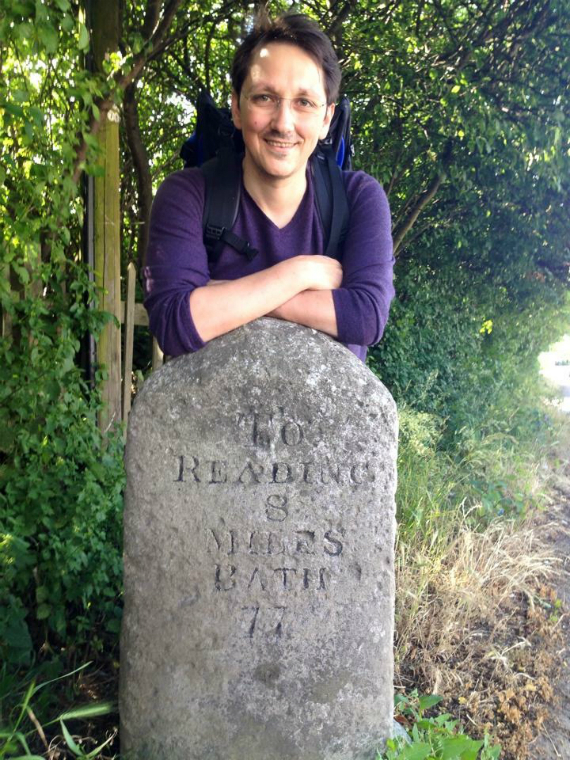
Photo Credit: Leon Stuparich
Your story informs your actions in a symbiotic relationship, but if the story doesn't start from your own heart and an understanding of your own nurtured inner values, then you're going to fall over!
Of all the lessons I have learned from the Dalai Lama, this is the most powerful so far: to live in your own integrity. To live honestly, with self confidence. To explore your inner values and deepen those and then live life from these values.
It certainly isn't easy, but walking the pilgrimage and putting my own values into action -- largely by going penniless -- has taught me that only through taking action, and the intention behind the action, can we really learn and therefore hopefully create a lasting change within ourselves and the world in which we live.
Today I hope this insight will inspire others and create a little more peace and love in the world.
After spending two extremely intimate weeks with the Dalai Lama, making his award winning film ROAD TO PEACE, Leon Stuparich wanted to take the Dalai Lama's message of peace and put it to the test. The Dalai Lama says that "peace starts within, and peace can only happen through action." So Leon decided to leave his home comforts of city life, and set himself the challenge to walk 200 miles in the ancient tradition of pilgrims, without spending money, taking food or water, and seeing if he could rely on the kindness and generosity of strangers to survive this epic journey of discovery. As a non-Buddhist, what he has learned has changed his perspective on life forever.
To find out more about the film ROAD TO PEACE or the Peace Walk please visit: http://www.roadtopeacefilms.com/.
